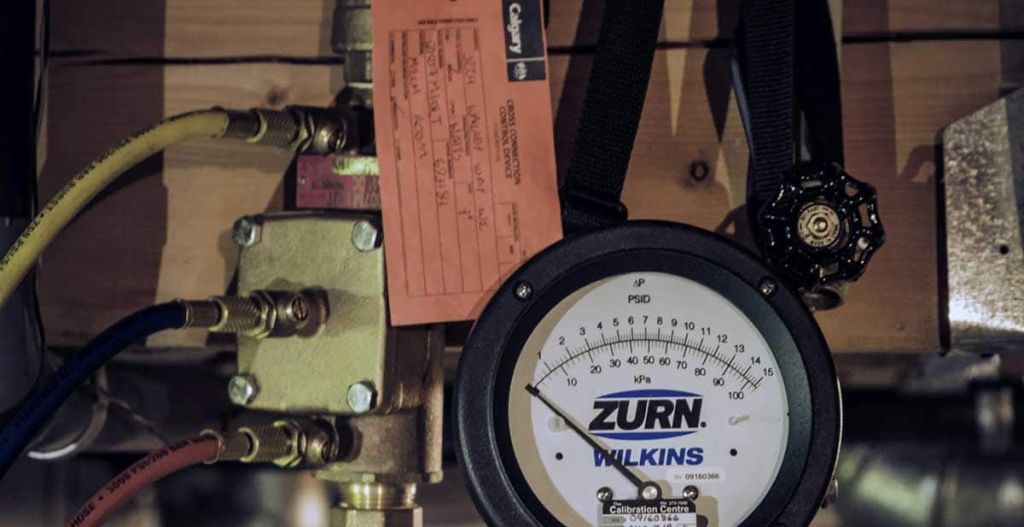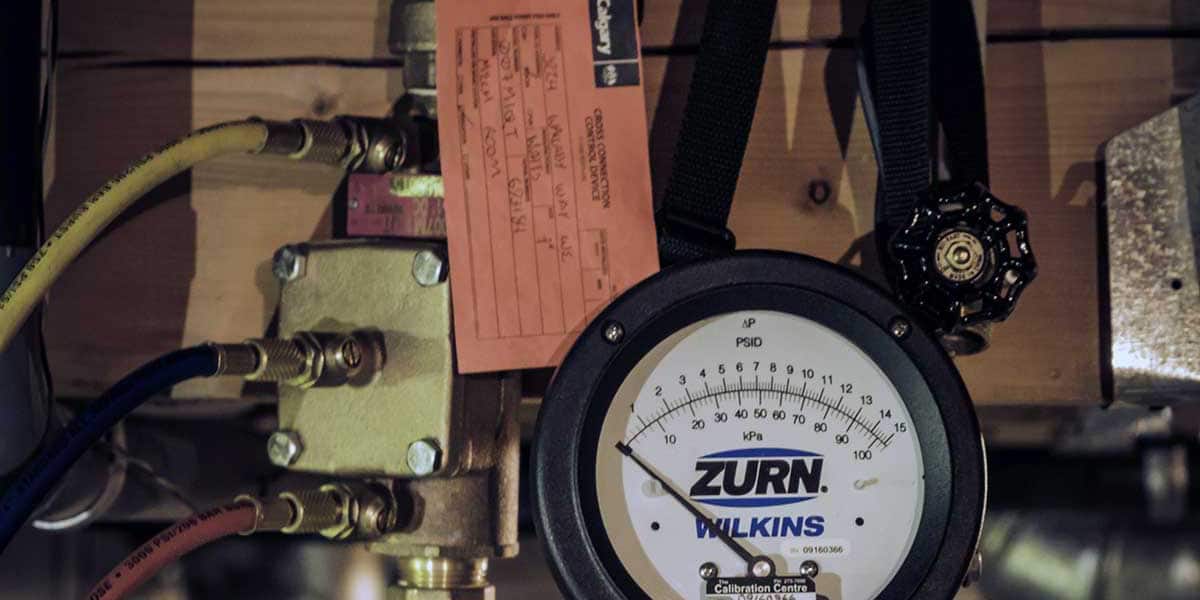
A cross connection test is when a backflow technician, certified by the City of Calgary, Alberta (or wherever you are), inspects your irrigation system’s backflow prevention device (or “cross connection device”). As per the National Plumbing Code of Canada, your sprinkler system needs a testable backflow prevention device at its cross connection, and it must be tested by a certified technician every year before it is activated. For the uninitiated, that may sound a bit opaque, but don’t be intimidated. The explanation is simpler than you’d think!
But wait! How much does a cross connection test cost?
Prices will vary from company to company, based on how much demand they experience and the level of training they provide to their technicians. Naiad Irrigation Systems charges $152.38 for a single cross connection test, or $119.25/year for an annual membership. (Alternatively, we can charge an equivalent $9.94/month if you prefer.) In addition to receiving a discount, members can have their tests booked automatically each spring after their first year.
It’s important to note that because this test must be performed by someone with a very specific certification, some irrigation companies may not be able to provide this service, and some non-irrigation companies can. Whoever you hire, be sure they send someone with the proper credentials and paperwork!
What is a cross connection
A cross connection is the point where a potable water supply feeds into an external system, like your underground sprinklers. Such systems often have some kind of backflow prevention device at the cross connection.
What is backflow, and what is backflow prevention?
A backflow prevention device prevents water from flowing back to where it came from, such as a household drain or a municipal potable water source. Backflow will otherwise happen whenever the water source experiences a drop in pressure (siphonage), or the external system exerts pressure of its own (backpressure).
There are several kinds of backflow preventers, which may prevent one or both kinds of backflow depending on their design and the needs of the external system. In the irrigation business, you will often hear backflow preventers called “cross connection devices” instead, since that’s where we expect to find them.
What type of cross connection device should my sprinkler system have?
As required by the National Plumbing Code of Canada, your sprinkler system needs a testable backflow preventer. Double check valve assemblies (DCVA’s) are the most common type of testable backflow preventers for modern residential irrigation systems, and they are not to be confused with dual check valves – their similar, but untestable predecessor. If your sprinkler system has a fertilizer injector (or “fertigation”), there should be a reduced pressure zone (RPZ) device instead, as these are specifically designed to protect potable water from contaminants like fertilizer.
Other common backflow preventers found on irrigation systems are usually some variation of a “vacuum breaker,” but these are usually only designed to block siphonage, not back-pressure. If your underground sprinkler system has a backflow preventer other than a DCVA or an RPZ device, we highly recommend an upgrade.
But does my underground sprinkler system need a cross connection test?
Where we’re based, in Calgary, Alberta, the answer is simply yes. This test must be performed before your irrigation system is activated each spring, by a certified cross connection tester who is registered with the City of Calgary. In fact, anywhere in Canada, you are required by your municipal water purveyor to have your irrigation system’s cross connection tested and documented by a certified professional annually – so believe me, we’re not just saying it to make a sale. Also be sure to fill out and submit the proper cross connection testing paperwork for your municipality.
If you’re reading this from somewhere else, a cross connection test might not necessarily be required, but in most places it is. Either way, we strongly recommend it.
Why does it matter if I book a cross connection test for my underground sprinkler system?
Nearly all communities require a backflow preventer at any cross connection that could potentially contaminate their potable water supply. A few may not include sprinkler cross connections on that list, since there are more obvious examples, but most do. No matter how perfect or pristine your sprinkler system is, it’s a potential source of contamination.
Polyethylene plastic, the most common tubing material used for residential irrigation systems, can gradually leach into water that it holds for extended periods of time. Also, whether or not your sprinkler system features fertigation, fertilizers, herbicides, and pesticides (as well as regular old dirt) can enter your sprinkler system unnoticed, flowing in from the outside when the system is inactive and the nozzles are at ground level.
This is normal, and rarely causes any damage to an underground sprinkler system. However, it means the water inside of most irrigation systems is not safe to drink, even though it’s safe for your lawn. Without a fully functioning backflow preventer, this non-potable water can mingle with your neighbourhood’s potable drinking water supply. So, agreeing with the National Plumbing Code of Canada, we at Naiad Irrigation Systems urge you to book a cross connection test for your sprinkler system each spring.
Why does it matter if I book a cross connection test for my underground sprinkler system?
If you’re here with us in Calgary, Alberta, we hope you will consider Naiad Irrigation Systems when you go to book your cross connection test.
Many other irrigation services, both here and elsewhere, can provide this service as well. So don’t let anything stop you! Be a good neighbour and book a cross connection test before you activate your underground sprinkler system this spring.
Book a service or call us today @ 587-200-3994. We provide top-notch services from Irrigation Association-certified professionals.
